|
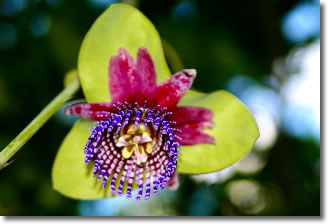 It
all started with a novel idea. In 1993, we were some of the initial
members of an international team of health professionals who set
off on an unprecedented expedition to the Amazon Rainforest of Peru
and the savannahs and forests of Kenya. The groups were organized
by the American Botanical Council (ABC), an herbal research and
interest organization from Austin, Texas. The trips were called
"Pharmacy from the Rainforest," and afforded American
pharmacists, naturopaths, physicians, botanists, and/or educators
a once-in-a-lifetime opportunity to study natural products and medicinal
plants in the world's greatest pharmacy – the rainforest. It
all started with a novel idea. In 1993, we were some of the initial
members of an international team of health professionals who set
off on an unprecedented expedition to the Amazon Rainforest of Peru
and the savannahs and forests of Kenya. The groups were organized
by the American Botanical Council (ABC), an herbal research and
interest organization from Austin, Texas. The trips were called
"Pharmacy from the Rainforest," and afforded American
pharmacists, naturopaths, physicians, botanists, and/or educators
a once-in-a-lifetime opportunity to study natural products and medicinal
plants in the world's greatest pharmacy – the rainforest.
The initial rainforest trips sponsored by ABC had a faculty world-renowned
in their knowledge of ethnobotany and herbal medicine. The late
Dr. Varro Tyler was one of the lecturers for the group. Joining
him were Dr. James Duke, author of The Green Pharmacy, noted ethnobotanist
Dr. Mark Plotkin, famed natural-medicine healer Dr. Rosita Arvigo,
and Mark Blumenthal, president and founder of the American Botanical
Council.
We – pharmacist Dan Wagner and naturopath Steve Morris –
first met on a sprawling trip through the Mausi Maura in Kenya in
1994. We have retained a close friendship ever since, bound by our
mutual respect of indigenous peoples and the plants that we use
for medicines; our love for the natural world, especially the rainforest;
and our own concept of in some small way constructing a healthier
ethos for our planet.
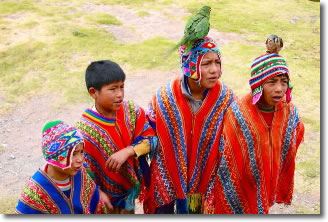 Upon
our return, we found ourselves looking at our perspective medical
practices (pharmacy and naturopathy) in a new light. Although Dan
Wagner had owned and operated a successful, independent, community
pharmacy located north of Pittsburgh, Pennsylvania, he had always
yearned for ways to look at the practice of pharmacy in a more holistic
and natural way. Steve Morris, who already owned a naturopathic
physician's practice in Mukilteo, Washington, had decided to expand
his horizons in naturopathy beyond what he learned in the classroom. Upon
our return, we found ourselves looking at our perspective medical
practices (pharmacy and naturopathy) in a new light. Although Dan
Wagner had owned and operated a successful, independent, community
pharmacy located north of Pittsburgh, Pennsylvania, he had always
yearned for ways to look at the practice of pharmacy in a more holistic
and natural way. Steve Morris, who already owned a naturopathic
physician's practice in Mukilteo, Washington, had decided to expand
his horizons in naturopathy beyond what he learned in the classroom.
Within two years, we decided to make this unique rainforest experience
a bigger part of our practices and our lives. Late in 1996, after
17 years of ownership, Dan decided to sell his independent pharmacy
to a chain drugstore. He opened an all-natural pharmacy that would
be more dedicated to consulting patients who choose to integrate
the use of allopathic medicines with dietary supplements and natural
products. He named the new concept pharmacy "Nutri-farmacy,"
coined from a lecture he attended in the Amazon by Dr. Jim Duke
entitled, "Food Farmacy."
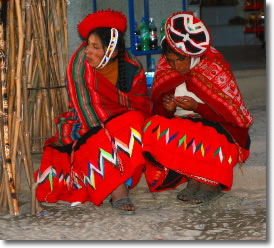 Steve,
acknowledges his teachers and mentors before him: Dr. John Bastyr,
who taught healing with kindness and compassion as well as science,
which he termed "The Truth of Medicine," helped patients
"hear" how to become well; Dr. Robert Anderson, friend
and co-worker for over 20 years, who selflessly shared his knowledge
of diagnosis; and Dr. James Duke who inspired a deeper love and
respect for ethnobotany, plant biology, and taxonomy. The longer
Steve practices Holistic Naturopathic Medicine, the more Dr. Bill
Mitchell's statement rings true: Steve,
acknowledges his teachers and mentors before him: Dr. John Bastyr,
who taught healing with kindness and compassion as well as science,
which he termed "The Truth of Medicine," helped patients
"hear" how to become well; Dr. Robert Anderson, friend
and co-worker for over 20 years, who selflessly shared his knowledge
of diagnosis; and Dr. James Duke who inspired a deeper love and
respect for ethnobotany, plant biology, and taxonomy. The longer
Steve practices Holistic Naturopathic Medicine, the more Dr. Bill
Mitchell's statement rings true:
The Vis is always there, internal,
inherent...it may need building blocks to heal itself...naturopathy
uses logic as a tool to look at the vital force...we also use
intuitive tools...a revelation between you and the patient that
occurs merely by the relationship alone...Recognize the answer
to what the patient needs is always there, and this recognition
will provide access to the revelation.
We soon collaborated on an idea
to do similar rainforest pharmacy excursions, but we desired to
take college-level students. We wanted young men and women who were
studying the health professions and who had a keen sense of enthusiasm
for natural medicine to have a grand opportunity to experience first-hand
the wonder and awe of the rainforest. We knew that these plant medicines
would be the source of many of the drugs and supplements they would
one day dispense or recommend.
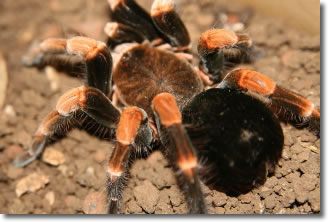 We
needed a name, a plan, and a teacher. The Student Rainforest Fund
(SRF) was the chosen name because we didn't want to set up an "organization,"
rather we wanted to have a fund that would help defray the costs
for the students to make the trip. Three years into the program,
the SRF earned a 501©3 status as a tax-deductible, educational
organization, which proved critical in our ongoing efforts to allocate
donations to keep the program going.We initially approached Dr.
Rosita Arvigo, whom we had met in the Amazon, as she was an internationally
known natural doctor who lived in Belize, Central America. She was
very amiable to the venture. We
needed a name, a plan, and a teacher. The Student Rainforest Fund
(SRF) was the chosen name because we didn't want to set up an "organization,"
rather we wanted to have a fund that would help defray the costs
for the students to make the trip. Three years into the program,
the SRF earned a 501©3 status as a tax-deductible, educational
organization, which proved critical in our ongoing efforts to allocate
donations to keep the program going.We initially approached Dr.
Rosita Arvigo, whom we had met in the Amazon, as she was an internationally
known natural doctor who lived in Belize, Central America. She was
very amiable to the venture.
So, in 1996, the precedent-setting first expedition of the SRF spent
11 fulfilling days in Belize. The first team of 17 student participants,
mostly pharmacy majors, spent three days of intensive fieldwork
with Dr. Rosita Arvigo. In the early years, the students participated
in important plant collections for the benefit of the National Cancer
Institute. Dr. Rosita was assigned to oversee an eight-year collection
of Belizian plants that would be scrutinized in the laboratory for
possible anti-cancer activity. It was a most rewarding project for
the students. Working alongside many wonderful traditional healers
over the years has been one of the hallmarks of the trips.
Dr. Rosita proved to be the consummate educator. She was closely
involved with many elders, midwives, shamans, and bushmasters who
were a part of the "traditional healers association,"
helping to save vast tracks of virgin rainforest and preserving
the ancient traditions of natural therapies and healing plants.
Our students got to be part of this wondrous work.
There was always time for fun and exploration and a new awareness
of a different culture. Subsequently, the next eight trips were
planned for Belize. The students visited the mysterious Mayan ruins
of Xunantunich, Caracol, and Cahal Pech. Some of the groups have
had the chance to visit the Jaguar National Forest located in the
central part of the country or the Pine Ridge Forest along the Guatemalan
border. Others have traveled far south to the city of Punta Gorda
and have swum in the pristine ocean and snorkeled in the barrier
reefs.
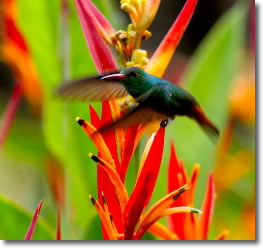 As
the years have gone by, more universities and colleges of pharmacy
have become involved in the program. To date, students studying
pharmacy, medicine, botany, and naturopathy have been represented
from over 30 colleges and universities. A few schools of pharmacy
and naturopathy have approved the SRF program for accreditation
to fulfill their doctorate-level degrees. As
the years have gone by, more universities and colleges of pharmacy
have become involved in the program. To date, students studying
pharmacy, medicine, botany, and naturopathy have been represented
from over 30 colleges and universities. A few schools of pharmacy
and naturopathy have approved the SRF program for accreditation
to fulfill their doctorate-level degrees.
In 2004, after eight consecutive years visiting Belize, the SRF
team traveled to Costa Rica. The largest group to date (32) spent
three days at the famous Wilson Botanical Gardens near Costa Rica's
east coast with Dr. Jorge Garcia, an incredible educator and a wealth
of knowledge. This garden is the largest in all of Meso-America.
For the first time we worked closely with the Organization of Tropical
Studies (OTS), an international environmental organization committed
to student education and the preservation of medicinal plants.
In June 2005, SRF embarked on its most ambitious expedition to date
– a journey to the vast Amazon rainforest. A team of 20 set
out for southern Peru on a ten-day expedition. This trip had many
memorable moments, and the response from the students was hugely
favorable. Most often cited was the quality time we spent with the
famed Amazonian shaman, Don Antonio Montero. Don Antonio was our
guide as we walked through the rainforest trails along the Madre
de Dios River. He took us to his ethnobotanical garden located near
the port city of Puerto Maldonado. Our journeys to the 12,500 foot-high
city of Cusco and the ancient Inca city of Machu Picchu were pure
magic.
We returned to the Peruvian Amazon in 2006 with a team of 22 students.
Each place we go we make connections with the local people that
directly benefit the educational process for the students. Drs.
Wagner and Morris have given dozens of lectures and programs related
to medicinal plants, ethnobotany, and holistic healing. The students
also have been blessed with a myriad of excellent instructors over
the first dozen years. A number of university professors from Duquesne
University, Shenandoah University, the University of Montana, and
Southwest College of Naturopathic Medicine have attended. More importantly,
the many indigenous healers with whom we have connected have been
wonderful teachers, guides, and colleagues in this unique educational
venture.
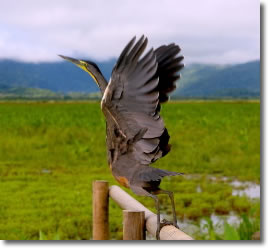 The
Student Rainforest Fund is committed to providing graduate college
students in naturopathy, pharmacy, and medicine with an opportunity
to explore the natural history of medicine and evoke the healing
knowledge of natural remedies and phytomedicinals in the world's
greatest pharmacy, the rainforest. The students benefit from an
invaluable perspective to holistic healing by learning from indigenous
peoples from different cultures. The
Student Rainforest Fund is committed to providing graduate college
students in naturopathy, pharmacy, and medicine with an opportunity
to explore the natural history of medicine and evoke the healing
knowledge of natural remedies and phytomedicinals in the world's
greatest pharmacy, the rainforest. The students benefit from an
invaluable perspective to holistic healing by learning from indigenous
peoples from different cultures.
The Student Rainforest Fund has assisted over 225 college students
to make this annual expedition to the rainforest. In June 2008,
SRF will be back in the Peruvian Amazon after trips to Ecuador and
Costa Rica in 2007. Plans are in the works to add a second trip
each year and travel to new locations such as Cuba, Suriname, or
Africa.
There is no other student program in the United States similar to
the SRF program. We are independent of any particular university,
individual, business, or foundation mandate. The board of advisors
of SRF is an impressive group of individuals dedicated to the proliferation
of medicinal plants and the preservation of these treasured forests.
We truly appreciate our contributors of the past 12 years, who have
donated their time, money, and effort into this unique student program.
We are always looking for more sources of revenue and donors who
are willing to help with this exceptional experience for medical
students and continue the adventure.
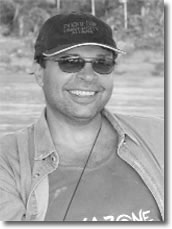
Steve Morris, ND
315 Lincoln Ave Ste. D
Mukilteo, WA 98275
drstevemorris.com
425-347-1951
Fax: 425-438-1761

Paradise
Lost
(a parody on the great John Prine's
Paradise)
by Dr. Jim Duke (with permission)
I praise you John Prine, and I hope you don't
mind,
If I reword your song to help the forest along.
Even while I am singing, the axeman is swinging,
Choppin' down all that green to plant corn, squash, and bean
Daddy won't you take me to the Primary
Forest
By the Amazon River where Paradise lies?
I'm sorry my son, but the forest is gone!
I'll show you some slides, that'll have to suffice!
Axeman unkind, you are blowing my mind!
Camu-camu and brazilnut, they can help fill your gut.
But year after year, once the forest is clear,
You'll have less and less food, and you'll run out of
wood.
If you'll not name me, there's
something I'll mention,
And so folks won't quote me, I'll quote Peter Jenson.
There may be stronger reasons, but I can't think of any.
We're losing the forest "because we're too many"!
Never thought ecotours could be one of the
cures;
Taking "green" bucks from gringos, getting mud on their
toes.
If the ecotours thrive, Indian cultures survive,
And the children will strive to keep tradition alive.
The Jason TV caught the shaman and me;
The kids could all see us teach medicinal trees.
Must'a been quite a scare, for the Mahuna there;
For them, the TV's like a spaceship to me.
The great spaceship Jason put down at ACEER,
A whole TV station, with mountains of gear.
And with trepidation, the natives came near.
Photos captured spirits, no wonder their fear.
No place I'd rather go, than to cruise
on the Napo;
Hoping some of my pleas, kinda' help save the trees.
I'd rather you'd find me, sunnin' with the tree
huggers
Than back in DC, always runnin' from muggers!
Momma won't you take me to the primary
forest
On the Amazon River where paradise lies?
I'm sorry my daughter, but I don't think I oughta'.
We've waited too long, now the forest is gone!
'Tis quite element'ry, our praise
for Al Gentry,
Whose conserving career really helped at ACEER.
The best botany brain went down with Al's plane,
And although he is gone, we must still carry on.
Sangredrago, muira puama, cacao, jatoba,
The forest's the best for your medicine chest.
Aware of these goods, you still chop down the woods.
You'd best spare that tree cause it might help spare thee
|



![]()
![]()
![]()
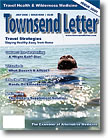
 It
all started with a novel idea. In 1993, we were some of the initial
members of an international team of health professionals who set
off on an unprecedented expedition to the Amazon Rainforest of Peru
and the savannahs and forests of Kenya. The groups were organized
by the American Botanical Council (ABC), an herbal research and
interest organization from Austin, Texas. The trips were called
"Pharmacy from the Rainforest," and afforded American
pharmacists, naturopaths, physicians, botanists, and/or educators
a once-in-a-lifetime opportunity to study natural products and medicinal
plants in the world's greatest pharmacy – the rainforest.
It
all started with a novel idea. In 1993, we were some of the initial
members of an international team of health professionals who set
off on an unprecedented expedition to the Amazon Rainforest of Peru
and the savannahs and forests of Kenya. The groups were organized
by the American Botanical Council (ABC), an herbal research and
interest organization from Austin, Texas. The trips were called
"Pharmacy from the Rainforest," and afforded American
pharmacists, naturopaths, physicians, botanists, and/or educators
a once-in-a-lifetime opportunity to study natural products and medicinal
plants in the world's greatest pharmacy – the rainforest.
 Upon
our return, we found ourselves looking at our perspective medical
practices (pharmacy and naturopathy) in a new light. Although Dan
Wagner had owned and operated a successful, independent, community
pharmacy located north of Pittsburgh, Pennsylvania, he had always
yearned for ways to look at the practice of pharmacy in a more holistic
and natural way. Steve Morris, who already owned a naturopathic
physician's practice in Mukilteo, Washington, had decided to expand
his horizons in naturopathy beyond what he learned in the classroom.
Upon
our return, we found ourselves looking at our perspective medical
practices (pharmacy and naturopathy) in a new light. Although Dan
Wagner had owned and operated a successful, independent, community
pharmacy located north of Pittsburgh, Pennsylvania, he had always
yearned for ways to look at the practice of pharmacy in a more holistic
and natural way. Steve Morris, who already owned a naturopathic
physician's practice in Mukilteo, Washington, had decided to expand
his horizons in naturopathy beyond what he learned in the classroom.
 Steve,
acknowledges his teachers and mentors before him: Dr. John Bastyr,
who taught healing with kindness and compassion as well as science,
which he termed "The Truth of Medicine," helped patients
"hear" how to become well; Dr. Robert Anderson, friend
and co-worker for over 20 years, who selflessly shared his knowledge
of diagnosis; and Dr. James Duke who inspired a deeper love and
respect for ethnobotany, plant biology, and taxonomy. The longer
Steve practices Holistic Naturopathic Medicine, the more Dr. Bill
Mitchell's statement rings true:
Steve,
acknowledges his teachers and mentors before him: Dr. John Bastyr,
who taught healing with kindness and compassion as well as science,
which he termed "The Truth of Medicine," helped patients
"hear" how to become well; Dr. Robert Anderson, friend
and co-worker for over 20 years, who selflessly shared his knowledge
of diagnosis; and Dr. James Duke who inspired a deeper love and
respect for ethnobotany, plant biology, and taxonomy. The longer
Steve practices Holistic Naturopathic Medicine, the more Dr. Bill
Mitchell's statement rings true:  We
needed a name, a plan, and a teacher. The Student Rainforest Fund
(SRF) was the chosen name because we didn't want to set up an "organization,"
rather we wanted to have a fund that would help defray the costs
for the students to make the trip. Three years into the program,
the SRF earned a 501©3 status as a tax-deductible, educational
organization, which proved critical in our ongoing efforts to allocate
donations to keep the program going.We initially approached Dr.
Rosita Arvigo, whom we had met in the Amazon, as she was an internationally
known natural doctor who lived in Belize, Central America. She was
very amiable to the venture.
We
needed a name, a plan, and a teacher. The Student Rainforest Fund
(SRF) was the chosen name because we didn't want to set up an "organization,"
rather we wanted to have a fund that would help defray the costs
for the students to make the trip. Three years into the program,
the SRF earned a 501©3 status as a tax-deductible, educational
organization, which proved critical in our ongoing efforts to allocate
donations to keep the program going.We initially approached Dr.
Rosita Arvigo, whom we had met in the Amazon, as she was an internationally
known natural doctor who lived in Belize, Central America. She was
very amiable to the venture. As
the years have gone by, more universities and colleges of pharmacy
have become involved in the program. To date, students studying
pharmacy, medicine, botany, and naturopathy have been represented
from over 30 colleges and universities. A few schools of pharmacy
and naturopathy have approved the SRF program for accreditation
to fulfill their doctorate-level degrees.
As
the years have gone by, more universities and colleges of pharmacy
have become involved in the program. To date, students studying
pharmacy, medicine, botany, and naturopathy have been represented
from over 30 colleges and universities. A few schools of pharmacy
and naturopathy have approved the SRF program for accreditation
to fulfill their doctorate-level degrees. The
Student Rainforest Fund is committed to providing graduate college
students in naturopathy, pharmacy, and medicine with an opportunity
to explore the natural history of medicine and evoke the healing
knowledge of natural remedies and phytomedicinals in the world's
greatest pharmacy, the rainforest. The students benefit from an
invaluable perspective to holistic healing by learning from indigenous
peoples from different cultures.
The
Student Rainforest Fund is committed to providing graduate college
students in naturopathy, pharmacy, and medicine with an opportunity
to explore the natural history of medicine and evoke the healing
knowledge of natural remedies and phytomedicinals in the world's
greatest pharmacy, the rainforest. The students benefit from an
invaluable perspective to holistic healing by learning from indigenous
peoples from different cultures.
